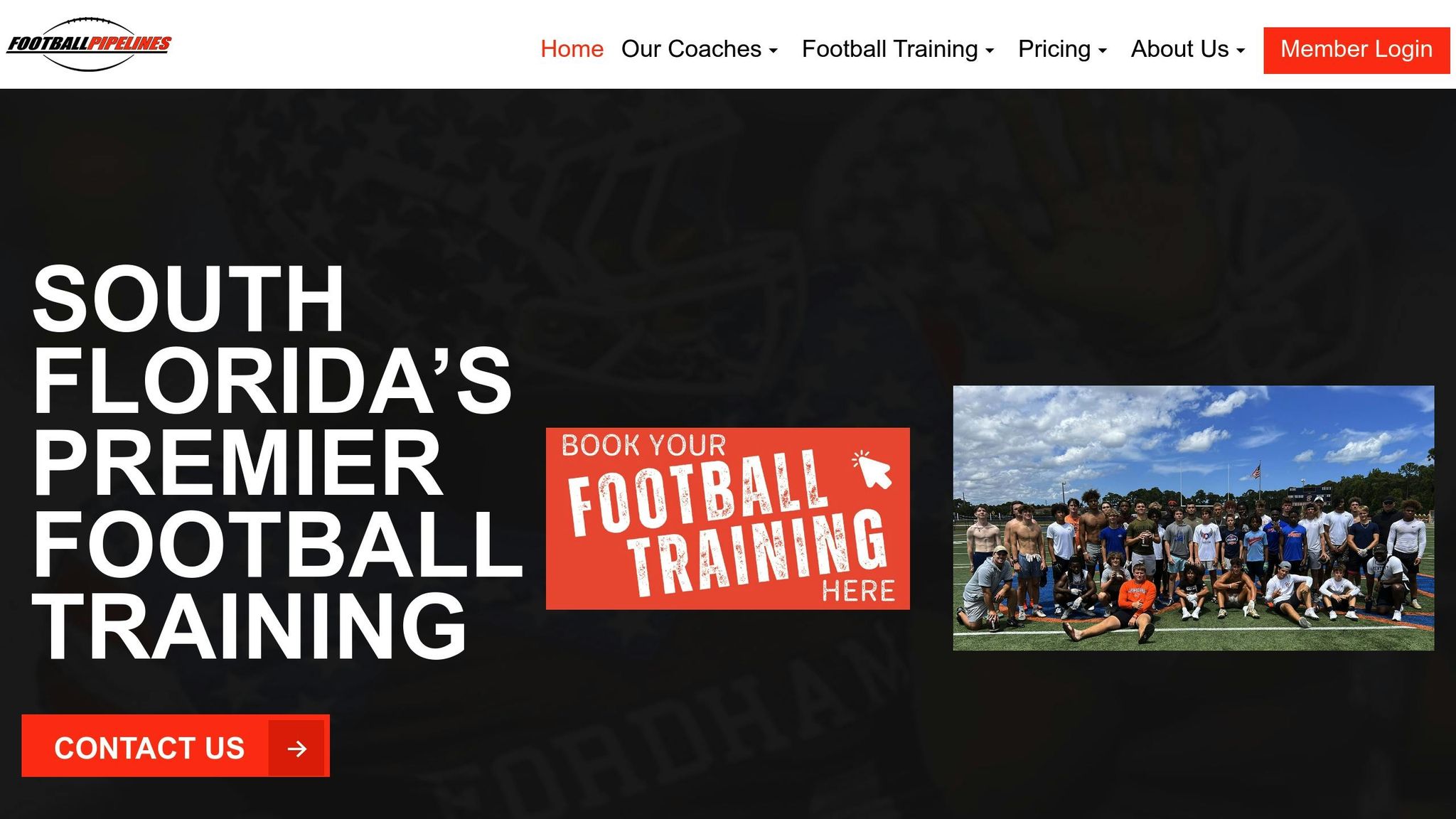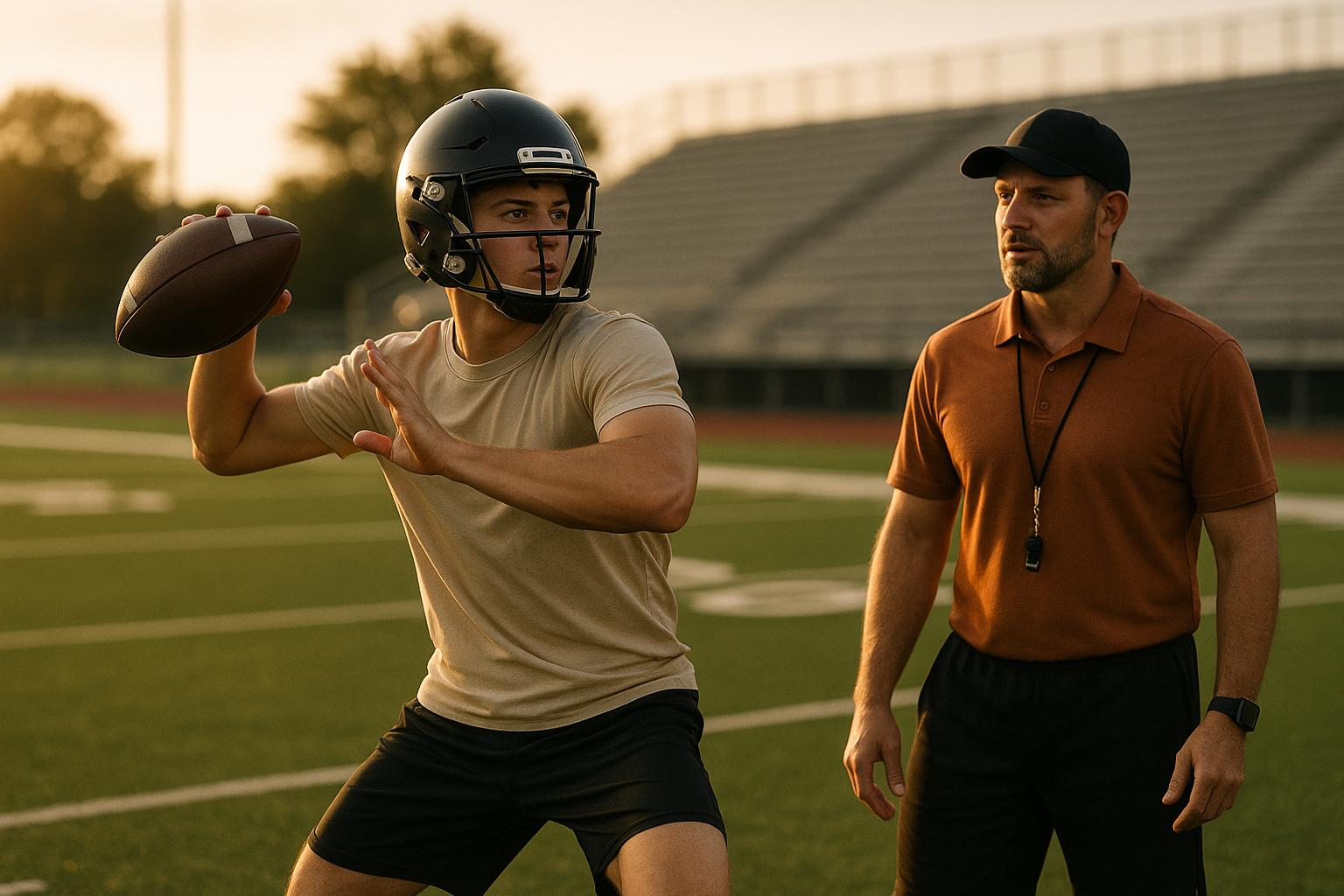1-on-1 quarterback training can be a game-changer for athletes looking to improve their skills, but it comes at a price. Sessions typically cost $30–$200 per hour, depending on the coach’s experience. Private training offers personalized attention, faster skill development, and access to professional-level coaching. However, it requires significant time, effort, and financial commitment. Group training or online resources may be more affordable alternatives for some families. The value depends on your goals, budget, and the athlete’s dedication to improvement.
Key Takeaways:
- Cost: $30–$200/hour based on coach expertise.
- Benefits: Tailored coaching, quicker progress, confidence building.
- Challenges: High cost, time demands, varying coach quality.
- Alternatives: Group sessions ($30–$60/athlete) or online resources.
Whether it’s worth it depends on the player’s goals and commitment.
What Private QB Training Actually Costs
Understanding the costs of private QB training can help families make informed decisions about their investment. Here’s a closer look at typical pricing and the factors that influence these rates.
Typical Prices for 1-on-1 QB Training
Private QB training rates generally range from $30 to $200 per hour, with prices varying based on the coach’s experience and background. Here’s a breakdown:
- Entry-level coaches: Often former high school or college players, these coaches typically charge between $30 and $50 per hour.
- Mid-level coaches: Those with college-level playing or coaching experience usually charge $50 to $80 per hour.
- Elite coaches: Coaches with professional or NFL experience command rates of $90 to $200 or more per hour. For example, Football Pipelines, known for "over 100 years of playing and coaching experience" and "over 13 years playing on various NFL teams", falls into this premium category.
Many coaches offer discounts through package deals, which can reduce the per-session cost. Group training sessions are another budget-friendly option, typically priced between $20 and $60 per athlete. These pricing tiers reflect differences in expertise, location, and session structure.
What Affects Training Prices
Several factors influence the cost of private QB training:
- Coach Experience: Coaches with NFL or professional experience tend to charge higher rates due to their expertise.
- Location: Geographic areas with a strong football culture, like South Florida, often have higher rates. The competitive landscape and higher living costs in these regions drive up training expenses.
- Session Frequency and Duration: More frequent or longer sessions naturally increase costs, though many coaches offer discounts for bulk bookings.
- Travel Fees: If the coach travels to your location, additional fees may apply. Some coaches include travel time in their hourly rates, while others charge separately.
- Rising Demand: The growing popularity of private coaching has led to increased prices. As a result, many families opt for bundled packages or group sessions to save money.
Main Benefits of 1-on-1 QB Training
Private quarterback training offers a level of personalized attention that group sessions and solo practice simply can’t provide. This tailored approach accelerates skill development and delivers high-level instruction that can elevate a player’s performance.
Better Skills and Performance
One-on-one training zeroes in on the mechanics that make a quarterback successful. Coaches focus on key areas like throwing accuracy, footwork, and release timing – without the distractions of a group setting. This concentrated effort helps players correct bad habits quickly, build muscle memory for proper technique, and sharpen their ability to read defenses and make quick decisions under pressure.
With personalized coaching, players not only refine their physical skills but also gain confidence in their leadership abilities. Coaches use clear metrics and benchmarks to track progress, measuring improvements in accuracy, release time, and decision-making speed. This data-driven approach ensures every session contributes to meaningful growth.
Personal Coaching and Feedback
The real game-changer in private training is the immediate, tailored feedback players receive. Unlike group settings, where attention is divided, one-on-one sessions allow coaches to assess an athlete’s strengths and weaknesses in detail. They can then design drills and exercises specifically to address those areas. This individualized focus ensures that every moment of training is productive.
Video analysis takes this a step further. By recording a player’s throwing mechanics and decision-making, coaches can review the footage to pinpoint exact areas for improvement. This visual feedback not only clarifies what needs adjustment but also allows players to track their progress over time.
Before training even begins, coaches often conduct a skills assessment to establish a baseline. This evaluation helps identify the areas that need the most attention, creating a clear roadmap for improvement from the very first session.
Training with Professional Coaches
While private training can come with a higher price tag, the benefits of working with professional coaches often outweigh the cost. Coaches with NFL experience bring unique insights and techniques that aren’t easily found elsewhere. Their knowledge, shaped by years of competing at the highest level, provides players with a competitive edge.
These elite coaches offer not only their expertise but also an up-to-date understanding of modern techniques and strategies. This ensures players are learning approaches that are relevant to today’s game, rather than outdated methods. The confidence players gain from receiving feedback from seasoned professionals is invaluable. Knowing that their training comes from someone who’s succeeded at the highest level naturally boosts their self-assurance.
Professional coaches also excel at tailoring the intensity of training to match each player’s needs. They strike the right balance between pushing for improvement and reinforcing the fundamentals, creating an environment where players can thrive and grow.
Drawbacks and Things to Consider
Private quarterback training has its perks, but it’s not without challenges. Weighing these potential drawbacks is essential to determine if this type of investment aligns with your goals and resources.
Money and Time Requirements
Private QB training can be expensive. Beyond the hourly coaching fees, families should plan for additional costs like travel, upgraded equipment, and sometimes facility rental fees. Compared to group sessions, private training typically comes with a heftier price tag.
Time is another big factor. Scheduling sessions, traveling to facilities, and dedicating extra hours to practice all add up. Balancing this with school, other sports, and family commitments can be tricky – and sometimes even slow down progress. It’s a significant commitment that requires careful planning.
Coaching Quality Can Vary
Not all private coaches are created equal. While many have impressive playing backgrounds – like former college or professional athletes – there’s no universal certification to guarantee consistent teaching skills. Some coaches excel on the field but struggle to break down techniques for younger players. Others might stick to outdated methods that don’t align with modern training approaches. Without thoroughly researching a coach’s experience, teaching style, and track record, families risk spending money on training that doesn’t deliver the results they’re hoping for.
Your Effort Determines Results
At the end of the day, the athlete’s dedication plays a huge role in how effective private training is. Discipline, self-motivation, and the drive to practice independently between sessions are non-negotiable. Without the constant push of a coach, athletes need to take ownership – working on mechanics, reviewing game film, and applying feedback on their own.
For athletes who thrive on external encouragement, this setup might not yield much improvement. And let’s be honest: the pressure of justifying the financial investment can sometimes lead to unrealistic expectations. Progress takes time, effort, and patience. Private training works best for those who are willing to put in the work consistently, even when no one’s watching.
sbb-itb-9b8e354
Is 1-on-1 QB Training Worth the Investment?
Whether private quarterback training is worth it depends on your specific situation, goals, and resources. As discussed earlier, the personalized nature of 1-on-1 training has its advantages and challenges. While it’s not a universal solution, it can be highly effective when matched to an athlete’s developmental needs.
Pros and Cons of 1-on-1 QB Training
Weighing the benefits and drawbacks can help families make a well-informed decision about this investment. Here’s a comparison of private and group training:
| Factor | Private Training | Group Training |
|---|---|---|
| Individual Attention | High (one-on-one focus) | Shared among multiple players |
| Skill Development | Targeted and faster improvement | Gradual progress in team settings |
| Cost | $40–$120+ per hour | $30–$60 per athlete per session |
| Game Simulation | Limited live-game scenarios | High (team-oriented situations) |
| Feedback | Immediate and personalized | Delayed or generalized |
| Scheduling | Flexible timing | Fixed group schedules |
| Leadership Growth | Limited team interaction | Strong focus on team dynamics |
The standout benefit of private training is the dedicated attention it provides, allowing coaches to focus on specific areas of improvement and accelerate progress. However, the cost and lack of exposure to game-like scenarios are significant considerations. Group training, on the other hand, offers a more affordable option with more realistic team interactions but less individualized feedback.
When Private QB Training Pays Off Most
Private quarterback training shines in situations where personalized coaching is critical. It’s especially beneficial for younger athletes building foundational skills or high school players aiming to prepare for college-level competition.
For youth players, private coaching can establish strong fundamentals that set the stage for long-term success. High school athletes preparing for the next level often see significant gains through tailored techniques and strategies that address their unique strengths and weaknesses. For example, private training can bridge the gap between high school and college by refining skills like footwork, release timing, and pocket awareness.
The investment becomes even more valuable for athletes targeting elite performance or professional opportunities. NFL draft preparation, combine training, and position-specific refinement all benefit from the focused, individualized attention that private coaching delivers.
What Makes Football Pipelines Different

Football Pipelines stands out in the world of private quarterback training by offering a unique combination of expertise, personalized attention, and flexibility.
Their coaching staff brings more than 100 years of combined playing and coaching experience, including over 13 years in the NFL. This wealth of knowledge ensures athletes learn techniques that align with the latest trends at professional, college, and high school levels.
Before training even begins, Football Pipelines offers an optional, free skills assessment tailored to each player’s position. This detailed evaluation helps create a custom training plan that addresses the athlete’s specific needs, ensuring a focused and effective approach.
Families can choose from a variety of training options to fit their budget and goals, including private sessions, group training, QB camps, NFL draft prep, and even virtual training through the PIPELINES app. This flexibility makes it easier to balance personalized coaching with financial considerations.
Football Pipelines doesn’t just focus on technical skills – they aim to build confidence and prepare athletes with modern techniques and schemes. Located in South Florida, a region known for producing top football talent, their year-round training exposes athletes to high-level competition and coaching standards essential for advancing to college and beyond.
Most importantly, Football Pipelines has a track record of proven results. They’ve successfully trained athletes across all levels – from youth to professionals – helping younger players compete alongside more experienced quarterbacks. Their personalized approach consistently delivers measurable progress, making them a trusted choice for quarterback development.
Final Thoughts: Deciding on 1-on-1 QB Training
Choosing private quarterback training is all about finding the right balance between your goals, budget, and available resources. While session costs can range from $40 to over $120, the value often goes beyond the price tag when you consider how it can shape an athlete’s development and open doors for future opportunities. Here’s a breakdown to help you weigh the pros, cons, and key recommendations.
Main Points to Keep in Mind
The decision to invest in private QB training should depend on your specific situation. For younger athletes, these sessions can be particularly impactful, as learning proper techniques early helps avoid bad habits that are tougher to fix later on. High school quarterbacks aiming for college recruitment also stand to benefit from the personalized instruction and advanced coaching that private training offers.
However, the quality of the coaching plays a huge role in justifying the cost. Since fees vary widely based on a coach’s expertise, it’s essential to research and choose wisely. If budget is a concern, there are alternatives. Group training sessions, which typically cost $30–$60 per athlete, can be a more affordable option. Additionally, free or low-cost online training resources can complement in-person learning.
Progress is the ultimate measure of whether private training is worth it. Improvements in areas like footwork, release time, accuracy, and decision-making show that the investment is paying off. If progress slows or the coaching doesn’t meet expectations, it’s worth reevaluating your approach.
Our Recommendations
To get the most out of quarterback training, start by evaluating the athlete’s current skill level, commitment, and long-term goals. Private training tends to deliver the best results for athletes who are serious about improvement, while those with more casual aspirations might find group sessions or online resources sufficient.
A hybrid approach can strike a good balance between cost and effectiveness. For example, occasional private sessions can focus on correcting specific technical issues, while group training provides valuable game-like scenarios and opportunities to develop teamwork and leadership. Supplementing this with online drills can further enhance skills without stretching the budget.
If you’re in South Florida, consider Football Pipelines’ free skills assessment to identify areas for improvement before committing to a program. With a coaching team boasting over 100 years of combined experience – 13 of those at the NFL level – the program offers professional-grade instruction at a range of price points.
The increasing demand for private coaching reflects families’ desire to give their athletes every possible edge. Still, private training is only one piece of the puzzle. Dedication, consistent practice, natural talent, and a well-rounded development plan – including team practices, film study, physical conditioning, and mental preparation – are equally important.
Private QB training is a worthwhile investment when it aligns with an athlete’s goals, fits the budget, and is led by experienced coaches. To ensure it’s a good match, take advantage of free assessments, ask for references, and consider starting with a trial session to gauge the fit for your quarterback’s learning style and needs.
FAQs
How do I know if my child is ready for private quarterback training, and what should I take into account?
If you’re wondering whether your child is ready for private quarterback training, start by assessing a few key things: their current skill level, how passionate they are about football, and their dedication to improving. Private training can be a great way to sharpen technique, boost confidence, and give them a competitive edge on the field.
Think about your child’s goals and their commitment to regular practice. Would they benefit from one-on-one coaching tailored to their needs? If so, Football Pipelines offers expert QB training in South Florida. Their personalized sessions are designed to help players of all skill levels enhance their abilities and grow as athletes, guided by coaches with professional experience.
How can I evaluate a private QB coach before investing in training?
To assess a private QB coach, start by examining their background and qualifications. Coaches with experience at the professional or collegiate level often bring a wealth of knowledge and advanced training techniques. It’s also important to see if they keep up with the latest developments in football across all levels – youth, high school, college, and professional – so their methods stay relevant and effective.
Also, focus on programs that prioritize skill improvement, confidence building, and tailored coaching. For instance, some programs boast coaches with decades of experience, including time spent in the NFL, which can signal a high level of expertise. Taking these factors into account can help you choose wisely and ensure you’re getting real value for your investment.
What age groups or skill levels benefit the most from 1-on-1 QB training?
One-on-one quarterback training offers tremendous benefits for players at every stage of their football journey, whether they’re just starting out or competing at the highest levels. For younger athletes, it’s all about learning the basics – developing proper mechanics and building a solid foundation. High school and college players, on the other hand, can use this focused training to sharpen advanced techniques and improve their decision-making under pressure. Even professionals turn to private coaching to fine-tune their skills and maintain a competitive edge.
At Football Pipelines, the coaching staff – many of whom bring NFL experience to the table – customizes their training to fit each player’s unique needs. This individualized approach not only helps athletes refine position-specific skills but also boosts their confidence, setting them up to perform at their best on the field.



